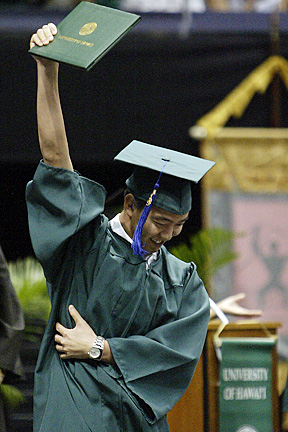COMMENCEMENT

George Takei, best known for his portrayal of Hikaru Sulu in the "Star Trek" saga, spoke about his experience with internment camps during World War II.
‘Star Trek’ star
inspires students
He tells graduates to boldly go
where none have gone before
TO HIS MANY FANS, he's simply known as Mr. Sulu, one of the original members of the "Star Trek" television series.
But yesterday, University of Hawaii graduates got to see a different side of George Takei, the actor who portrayed Mr. Sulu in the futuristic show where nationality or race did not seem to matter.
In his distinctive voice, Takei, 68, delivered the keynote address at UH's summer commencement exercise, telling 400 graduates at the Stan Sheriff Center yesterday to follow their hearts.
Takei shared his struggles of becoming an actor, but he also shared stories of childhood days spent in internment camps on the mainland during World War II, when Japanese Americans were forced to leave their homes. And he told them how his family lost everything before they could rebuild their lives.
BUT OF COURSE, he also found time to talk about his beloved "Star Trek," which gave viewers of the time a glimpse of the not-too-distant future.
"The realities of those times, the 1960s, however, were dramatically different," he told the graduates. "To communicate we wrote letters, on our typewriters, then put it in an envelope with a 13-cent stamp and mailed it. ... But on 'Star Trek' we communicated instantaneously. We sent and received information across the galaxy through an amazing device that we called our console.
"Fast-forward 40 years, and we recognize that equipment as our computer, today found on every desk in any office or home. On 'Star Trek' we walked around wearing a fantastic device on our hip. Whenever we wanted to talk to someone, wherever we were, we'd tear it off, flip it open and start talking," he continued.
"That futuristic gadget has now become a very real nuisance," Takei said as graduates and attendees laughed.
But the past is just as important as the unknown future for Takei, who talked about his family's struggles to make things right after World War II.

Jonathan Nakamoto struck a triumphant pose yesterday morning after receiving his diploma for a degree in business administration at the University of Hawaii's commencement at the Stan Sheriff Center.
Three months later, Takei and his family were forced to board a train to Camp Rohwer in Arkansas, where they were held with other Japanese-American families for a year and a half. They were later transferred to an internment camp at Tule Lake in Northern California, where they were forced to stay until the war ended.
"It was normal for me to see the barbed-wire fence and the tall guard towers as I was reciting the words 'for liberty and justice for all.' The irony of it all," Takei said last week in a phone interview.
Takei acknowledged the young Japanese Americans who were interned at camps and volunteered to serve in the Army, and he commended the 442nd Regimental Combat Team for their service.
"These amazing men, who did astounding deeds under the most incredible of circumstances, made it possible for me to do what I love. We, all of us, share in this legacy," he said.
TAKEI'S ACTING CAREER, which has spanned four decades, continues to thrive. And he continues to be active in the community, now serving as council chairman of the East West Players, the nation's foremost Asian Pacific American theater in Los Angeles. He is also chairman emeritus of the board of trustees of the Japanese American National Museum, and he is on the advisory committee of the California Civil Liberties Public Education Program.
In November, Takei traveled to Japan to receive the Order of the Rising Sun medal from Emperor Akihito at the Imperial Palace in Tokyo for his service in promoting U.S.-Japanese relations.
After yesterday's graduation ceremony, Michael Cocciolone, who received a bachelor's degree in marketing, waited with his ceremonial green cap in his hands hoping for an autograph as Takei shook hands and chatted with other attendees.
Cocciolone, 26, described Takei's keynote address as inspiring. He admires Takei for overcoming adversity and taking an active role in the community. "He's just one of those people who will keep on going," he said.
www.georgetakei.com
E-mail to City Desk
[News] [Business] [Features] [Sports] [Editorial] [Do It Electric!]
[Classified Ads] [Search] [Subscribe] [Info] [Letter to Editor]
[Feedback]
